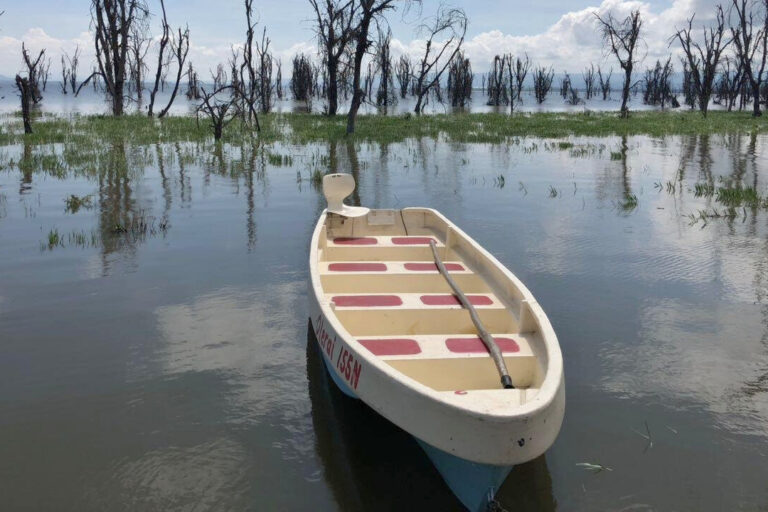- An expansive study traced the growth of 300,000 trees over three decades in Africa and the Amazon and compared how forests on the two continents were faring.
- The researchers estimate that intact tropical forests absorbed 46 billion tons of carbon dioxide from the atmosphere in the 1990s, but this figure plummeted to 25 billion tons in the 2010s.
- If these tropical forests turn into net carbon sources, it will accelerate climate change, which in turn will be detrimental to the health of these forests, kicking off a downward spiral.
- The study also found that forests in the Amazon are weakening as a carbon sink faster than those in Africa.
Traditionally undisturbed tropical forests in Africa and the Amazon are losing their ability to stash away carbon — and it’s happening much faster than scientists anticipated, according to a new study in Nature.
“Intact tropical forests remain a vital carbon sink, but this research reveals that unless policies are put in place to stabilize Earth’s climate, it is only a matter of time until they are no longer able to sequester carbon,” study co-author Simon Lewis, from the School of Geography at University of Leeds, U.K., said in a statement.
The wide-ranging study traced the growth of 300,000 trees over the course of three decades in 565 forests in Africa and the Amazon, and compared how forests on the two continents were faring.
In 2019, fires in the Amazon raised alarm bells and brought attention to the critical role forests play in maintaining the carbon budget by removing CO2 from the atmosphere and converting it into biomass that remains locked in standing trees. Intact tropical rainforests are even more critical in safeguarding against runaway climate change than other types of forest.
The forests studied in the new paper have captured a combined 250 billion tons of carbon in their trees, or about 90 years’ worth of global fossil fuel emissions at present-day levels. But their ability to keep absorbing more indefinitely is under threat.
The researchers estimate that intact tropical forests sucked out 46 billion tons of CO2 from the atmosphere in the 1990s, but that this figure plummeted to 25 billion tons in the 2010s. That gap is equivalent to a decade’s worth of fossil fuel emissions from the U.K., Germany, France and Canada combined.
While the growing concentration of CO2 in the atmosphere boosts photosynthesis and increases the ability of trees to grow and store carbon as biomass, the attendant rise in average temperatures has had the opposite effect.
The rapidly warming climate is taking a toll on forests. One of the main reasons for diminished carbon-sequestering ability is the death of trees. Higher temperatures and drier conditions curb the growth of trees and can prove fatal. Dying trees will, as they decay, release all those decades of stored carbon back into the atmosphere.
And if these tropical forests turn into net carbon sources, the result will be accelerated climate change, which in turn will be detrimental to the health of these forests, thereby sustaining a downward spiral.
The study found that forests in the Amazon are weakening as carbon sinks faster than forests in Africa. Their carbon sequestration potential peaked in the 1990s and has been in decline ever since. They are expected to flip into carbon sources as early as the mid-2030s. In Africa, the same thing has occurred, but the decline of forests there as carbon sinks started later, in the 2010s.
This is worrying because even the most conservative climate models assume that tropical forests will persist in their roles as carbons sink for decades. That now appears to be the more optimistic scenario.
“Given that the intact tropical forest carbon sink is set to end sooner than even the most pessimistic climate-driven vegetation models predict our analyses suggest that climate change impacts in the tropics may become more severe than predicted,” the authors write in the paper.
To stem this decline of forests as carbon stores, it is necessary not just to curb carbon emissions but also to tackle pressing threats to undisturbed woodland. “The immediate threats to tropical forests are deforestation, logging, and fires,” Lewis said. “These require urgent action,” Lewis said.
Citation:
Hubbau, W., Lewis, S. L., Phillips, O. L., Affum-Baffoe, K., Beeckman, H., Cuní-Sanchez, A., … Zemagho, L. (2020). Asynchronous carbon sink saturation in African and Amazonian tropical forests. Nature, 579, 80-87. doi:10.1038/s41586-020-2035-0
(Banner Image: A view of forest fires in Lábrea, Amazonas state. Image Courtesy: Victor Moriyama/ Greenpeace.)














